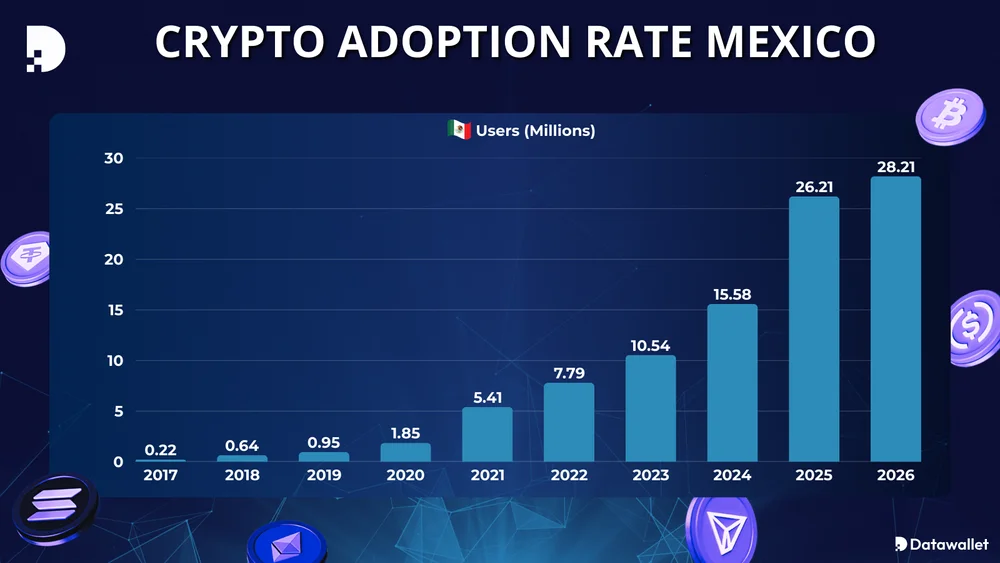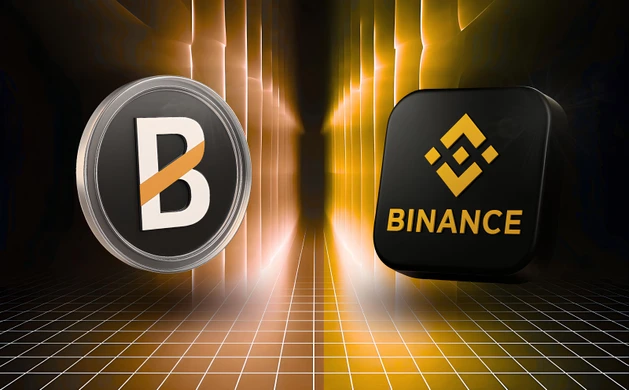Best Crypto Exchanges in Mexico
.webp)
Summary: Mexico has become a key Latin American market for crypto, shaped by the 2018 Fintech Law that regulates “virtual assets” under strict oversight from Banxico and the CNBV. While digital currencies are not legal tender, regulated cryptocurrency exchanges can offer secure access.
Here are the leading digital asset platforms supporting Mexican peso (MXN) deposits:
Bybit is the best platform for Mexico due to its compliance with local regulations, support for multiple MXN deposit methods, competitive fees, and extensive cryptocurrency offerings.
Available Assets
2,100+ Cryptocurrencies
Fees
0.1% Spot Trading Fees
MXN Deposit Methods
Bank Transfer, SPEI Transfer & Cards
Top Crypto Trading Platforms in Mexico
Mexico has developed a regulatory framework under its Fintech Law, overseen by the Comisión Nacional Bancaria y de Valores (CNBV) and Banxico, which helps protect consumers and ensure transparency in digital asset trading. Below is a comparison of the best exchanges for Mexican users, looking at trading fees, supported assets, MXN payment methods, and platform features.
Exchange |
Cryptocurrencies |
Trading Fees |
Deposit Methods |
Key Features |
|---|---|---|---|---|
| Bybit | 2,200+ |
0.1% |
SPEI, CLABE, Cards, Google Pay, Apple Pay, P2P |
Futures, Options, Bybit Earn, Launchpad, Copy Trading, Trading Bots |
| Kraken | 520+ |
Maker 0.12%, Taker 0.26% |
Bank Transfer, Credit/Debit Cards |
Kraken Pro, Futures, Margin (5×), Staking, OTC Desk, Stocks, xStocks |
| OKX | 350+ |
Maker 0.08%, Taker 0.1% |
Credit/Debit Cards, Apple Pay, Google Pay, P2P |
OKX Wallet, Copy Trading, Options, Futures, Trading Bots, Earn |
| Binance | 500+ |
0.1% |
SPEI, Credit/Debit Cards, P2P |
Binance Earn, Copy Trading, Trading Bots, Futures, Launchpool |
| Gate | 3,600+ |
0.2% |
Bank Transfer, SWIFT, Credit/Debit Cards, Apple Pay, Google Pay, Revolut, P2P |
Launchpad, Copy Trading, Trading Bots, Futures, Simple Earn |
| Bitso | 100+ |
0.1% |
SPEI, Credit/Debit Cards, Direct MXN Deposits |
Bitso Alpha, Remittances, Digital Dollars, Proof-of-Reserves |
1. Bybit - Best Cryptocurrency Exchange in Mexico
Bybit, founded in 2018, has become a top choice for Mexican traders thanks to its 76 million registered customers, US$34 billion in daily trading volume, and a platform available in Spanish. It lists more than 2,200 cryptocurrencies for spot and futures trading, and offers both retail and institutional products.
The exchange provides an extensive set of tools beyond simple spot trading. Users can access perpetual and futures contracts, options, and early token launches through Launchpad. Passive investors can take advantage of Bybit Earn, which includes flexible savings, dual investments, and staking.
Its security features include 1:1 proof-of-reserves, two-factor authentication, and cold wallet storage, making it a trusted option. Automation is another standout. Bybit Trading Bots allow grid, DCA, and futures combo strategies, while Copy Trading enables beginners to follow experienced traders.
Platform Highlights:
- Fees: Spot fees start at 0.1%.
- Supported Assets: 2,200+ cryptocurrencies.
- Regulation & Licensing: Licensed globally and available in Mexico.
- MXN Deposit Methods: Bank transfers (SPEI), CLABE, credit/debit cards, Google Pay, Apple Pay, and P2P trading via STP, Mercadopago, BBVA, Citibanamex, and Banregio.

2. Kraken - Preferred by Institutions and Companies
Kraken has been building since 2011, and it shows with 15 million clients. For Mexico, the draw is a professional stack married to an easy “money app” flow, buy from 520+ cryptocurrencies, convert instantly, set auto-invest schedules, send payments, and track positions in Spanish on mobile or desktop.
Traders get Kraken Pro and Kraken Desktop with low spreads, deep books, and advanced orders. There’s margin up to 5× and 300+ perpetual futures with multi-collateral support. Education, 24/7 support, and proof-of-reserves reporting round out the trust pitch for retail and corporate treasuries.
For diversification, users can access stocks and xStocks (on-chain representations of U.S. equities/ETFs). Ink opens a simplified path to DeFi without leaving the ecosystem. The user interface can also be used in Spanish, making the investment experience simple for Mexican investors.
Platform Highlights:
- Fees: Maker fee starts at 0.12% and taker starts at 0.26%; Kraken+ can offer zero-fee trading on eligible pairs.
- Supported Assets: 520+ cryptocurrencies.
- Regulation & Licensing: Licensed in the USA and available in Mexico.
- MXN Deposit Methods: Bank transfer, credit card, debit card.

3. OKX - Offers OKX Wallet, Giving Access to Web3
OKX offers a full-stack exchange with a Web3 gateway, making it a strong pick for Mexican users who want trading and on-chain tools in one place. You can buy and sell crypto in minutes with quick convert at zero trading fees, or step up to the classic trade interface for spot markets with fast execution.
The mobile app is offered in Spanish and connects directly to OKX Wallet, so you can hold keys, interact with dApps, and manage NFTs without leaving the ecosystem. Sponsorships with major sports brands amplify credibility, but the edge is the exchange’s support for 20+ MXN payment methods.
Derivatives are another core strength. OKX supports perpetual and dated futures with leverage, options for volatility strategies, and a copy trading feature to mirror other traders. There are also trading bots for grid and DCA, plus advanced tools for spreads, custom multi-leg strategies, and block trades.
Platform Highlights:
- Fees: Spot trading starts at 0.08% for makers and 0.1% for takers.
- Supported Assets: 350+ cryptocurrencies.
- Regulation & Licensing: Regulated in multiple jurisdictions and accessible from Mexico.
- MXN Deposit Methods: Credit card, debit card, Apple Pay, Google Pay, P2P MXN markets.

4. Binance - Popular Option for Copy and Bot Trading
Binance is the world’s largest exchange, trusted by over 289 million users. In Mexico, it remains one of the most accessible platforms, offering more than 500 cryptocurrencies and deep liquidity on spot, margin, and futures markets. The Binance app is available in Spanish and supports full KYC verification.
The exchange provides a broad product suite: Spot, Margin, and Futures trading, and a P2P marketplace where users can buy or sell crypto directly with Mexican pesos. For passive strategies, Binance Earn includes savings, staking, crypto loans, liquidity farming, and structured products.
Automation and community tools are key attractions. Mexicans can use copy trading to mirror top-performing traders or deploy trading bots for DCA, grid, and futures strategies. Institutions and high-volume users have access to VIP services, an OTC trading desk, and API connectivity.
Platform Highlights:
- Fees: Spot trading at 0.1%, with discounts when paying in BNB or using VIP tiers.
- Supported Assets: 500+ cryptocurrencies.
- Regulation & Licensing: Binance, operating under Bmex Techfin, S. de R.L. de C.V., has been granted a Vulnerable Activity registration by the Tax Administration Service (SAT).
- MXN Deposit Methods: SPEI bank transfer, credit card, debit card, P2P MXN trading.

5. Gate - Largest Selection of Cryptocurrency (3,600+)
Gate, founded in 2013, has become a global exchange known for its 3,600+ cryptocurrencies for spot and futures trading. With 38 million registered users and a 24-hour trading volume of US$25.8 billion, Gate provides unmatched liquidity across both major coins and small-cap tokens.
Beyond trading, Gate offers copy trading so beginners can follow strategies from top-performing investors, as well as trading bots for grid and DCA strategies. Its Startup Launchpad gives users access to early-stage projects, a feature that has built Gate’s reputation for being first to list new tokens.
Security is a focus, with a published reserve ratio of 123.98% to assure customers that funds are backed in full. For Mexicans, the combination of local payment support, thousands of assets, and innovative investment products makes Gate a compelling option for long-term investors.
Platform Highlights:
- Fees: Spot trading starts at 0.2%; discounts with GateToken (GT) or higher tiers.
- Supported Assets: 3,600+ cryptocurrencies.
- Regulation & Licensing: Registered internationally with full AML/KYC requirements.
- MXN Deposit Methods: Bank transfer, SWIFT, credit card, debit card, Apple Pay, Google Pay, Revolut.

6. Bitso - Leading Mexican Crypto Exchange
Bitso, founded in 2014 in Mexico City, has grown into Latin America’s largest exchange with 9 million users worldwide and a strong reputation for compliance and transparency. It supports over 100 cryptocurrencies, from Bitcoin and Ethereum to Solana, XRP, and a wide range of altcoins.
What sets Bitso apart in Mexico is its role in facilitating $6.5B in remittances from the U.S. to Mexico, proving its relevance in real-world cross-border payments. Regulation and trust are central to Bitso’s appeal. It holds licenses in Mexico, Brazil, and Argentina, plus authorization in Gibraltar.
The platform offers multiple ways to grow and manage assets. Users can earn up to 16% annually on selected coins like USDC, ETH, SOL, and ATOM through Bitso’s yield products, while “Digital Dollars” (USD-pegged stablecoins) allow investors to hedge against peso depreciation.
Platform Highlights:
- Fees: Spot trading fees start at 0.1%.
- Supported Assets: 100+ cryptocurrencies.
- Regulation & Licensing: Registered under Mexico’s Fintech Law, licensed in Brazil, Argentina, and Gibraltar (GFSC).
- MXN Deposit Methods: SPEI bank transfers, debit/credit cards, and direct peso deposits through the Bitso app.

Is Crypto Regulated in Mexico?
Mexico treats cryptocurrency through a careful, evolving legal framework designed to balance innovation, consumer protection, and financial stability. The central law is the Fintech Law of 2018, which formally defines virtual assets as electronically registered value transferred by electronic means, but clarifies that they are not legal tender but can be held and traded legally.
Key regulatory and supervisory bodies include:
- Banco de México (Banxico): Mexico’s central bank, which regulates how financial institutions may use virtual assets, and has the power to issue rules, including restrictions on services they can offer.
- National Banking and Securities Commission (CNBV): supervises financial and fintech institutions, ensuring they follow regulations involving virtual asset use.
All virtual asset businesses (including crypto exchanges) must follow AML/CTF rules, including Know-Your-Customer (KYC) procedures to verify identities and reporting of suspicious transactions and transactions above certain thresholds.
How is Crypto Taxed in Mexico?
Mexico’s tax authority, the Servicio de Administración Tributaria (SAT), taxes cryptocurrency under general tax laws rather than a bespoke regime. Cryptocurrency in Mexico is taxed under existing income and VAT rules, with no dedicated framework. The key tax types are:
- Income Tax (ISR): Residents taxed on worldwide crypto gains, non-residents on Mexican-source income. Individuals must make a 20% advance payment on sales, except when the total is MXN 227,400 or less. Businesses pay monthly on net profits and can carry forward losses for up to 10 years.
- Value Added Tax (VAT): Crypto sales in Mexico face 16% VAT, while exports are taxed at 0%. Mining is treated as a taxable service with 16% VAT if done domestically.
Crypto is classified as intangible movable property, not legal tender. Payments in crypto for goods or services can trigger VAT and ISR obligations. Investors should maintain clear transaction records for reporting, as tax authorities require transparency and compliance.
Cryptocurrency Adoption in Mexico
Mexico’s crypto market is expanding rapidly as digital assets gain traction for investment, payments, and remittances. Statista Market Insights projects that by 2025 there will be 27.1 million cryptocurrency users in the country, representing a penetration rate of over 20% of the population.
Together with a young, tech-oriented population and rising investor appetite, these conditions are driving the need for regulated exchanges offering peso deposits, competitive fees, and robust security for millions of new participants entering the market.

How to Buy Bitcoin in Mexico
For residents in Mexico, buying Bitcoin has become more accessible than ever. Trusted domestic platforms and reputable international exchanges now provide safe access to Bitcoin with support for Mexican peso (MXN) deposits. Here’s a step-by-step guide to getting started:
- Select a Crypto Exchange: Choose a regulated Mexican exchange or a well-known global platform that allows MXN deposits and follows anti-money laundering standards.
- Create Your Account: Sign up and complete Know Your Customer (KYC) checks by providing a government-issued ID (such as INE or passport) and proof of address, like a bank statement or utility bill.
- Deposit Funds: Fund your account using supported payment methods. Most exchanges in Mexico accept bank transfers in MXN, debit or credit cards, and increasingly, digital wallets.
- Purchase Bitcoin (BTC): Once your account is funded, go to the Bitcoin trading section, enter the amount you want to purchase, review the order details, and confirm the transaction.
By following these steps, investors in Mexico can purchase Bitcoin through secure exchanges while ensuring compliance with local regulations and protecting their assets.
Final Thoughts
Mexico’s crypto market is evolving quickly under the Fintech Law, combining regulatory oversight with rising adoption among individuals and businesses. With more than 27 million users expected by 2025, investors should focus on exchanges that offer peso deposits, transparent fees, and strong compliance standards.
The best approach is to choose platforms that align with your goals, whether that’s advanced derivatives on Bybit or Kraken, Web3 access on OKX, automated trading on Binance, broad token coverage on Gate, or local trust with Bitso.
Frequently asked questions
Can I use Mexican pesos to buy stablecoins like USDT or USDC?
Yes, most major exchanges in Mexico support peso deposits through SPEI transfers, cards, or P2P markets, allowing you to buy stablecoins such as USDT or USDC for easier trading and payments.
Are remittances from the U.S. to Mexico possible with crypto?
Yes, exchanges like Bitso have integrated crypto into cross-border transfers, enabling Mexicans to receive remittances faster and at lower cost compared to traditional money transfer services.
Is staking cryptocurrency legal in Mexico?
Yes, staking is permitted and offered by several exchanges. While returns are allowed, they are treated as taxable income under general tax rules, so they must be reported to the tax authority.
What payment methods are typically supported for depositing MXN into global crypto exchanges?
Several common options for depositing Mexican pesos include SPEI (bank transfers), debit or credit cards, third-party payment gateways, and P2P trading markets. Some exchanges also use regulated IFPEs to streamline fiat on-ramps for MXN.

Written by
Emily Shin
Research Analyst
Emily is passionate about Web 3 and has dedicated her writing to exploring decentralized finance, NFTs, GameFi, and the broader crypto culture. She excels at breaking down the complexities of these cutting-edge technologies, providing readers with clear and insightful explanations of their transformative power.




.webp)




